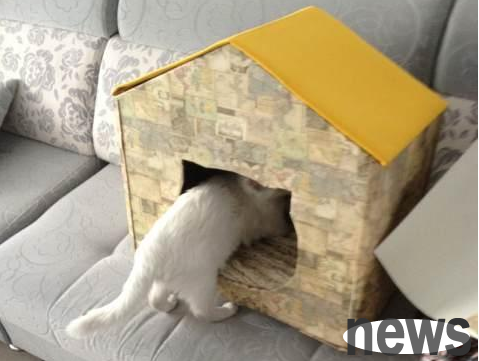Generally speaking, the pregnancy period of female cats is 56 to 71 days, and on average it is about 65 days. If your cat is pregnant when he follows you home, it has been 62 days today and it is estimated that it will give birth within two weeks. T...
Generally speaking, the pregnancy period of female cats is 56 to 71 days, and on average it is about 65 days. If your cat is pregnant when he follows you home, it has been 62 days today and it is estimated that it will give birth within two weeks.

The first priority is to arrange a delivery room for it. The large (probably two cats can be installed) is the best carton (if it is a very tall carton, you need to seal the top and open an entrance for the cat on the side), put some clean old clothes or towels on it, put a thicker waste paper on the clothes (if it is dirty, you can throw it away), and make some warm measures nearby (for example, hang a light bulb about 40w away from the bottom at least 40cm away, and cover it with black cloth). If the cat doesn't like the delivery room you set up, it may find a corner away from light. Just lay out clothes and paper pads for it in the place it chooses, and place warm measures.
If a female cat is giving birth for the first time, the time may last between 4-42 hours. The birth interval between the kittens born in one child is 10 minutes-1 hour. There may be signs before giving birth, such as frequent licking of the body, restlessness, gasping, meowing, looking for a quiet place to avoid light, etc. There will be continuous lochia emissions 2-3 weeks after delivery, but female cats will usually clean them up by themselves.
After the female cat is born, pay attention to the environment insulation and quietness, and try not to disturb the female cat and kittens. Water basins, food basins and sand basins should be placed not far from the delivery room for convenience for female cats.
Female cats may experience hypocalcification after giving birth. If it develops symptoms of stiff gait, tremor, vomiting and wheezing, calcium supplementation can be appropriately supplemented.
If a difficult delivery occurs during delivery, you should be sent to the hospital immediately. Please prepare the contact information of the nearby hospital in advance.
The calories before and after giving birth need to be slightly higher than usual, so you can appropriately add meals to the female cat to supplement nutrition. Steamed chicken breasts, fish that removes thorns, a small amount of eggs and other high-protein foods are all good choices. At the same time, you can prepare kitten's pet bottles and cat milk powder in advance to deal with the situation where kitten needs to be fed manually in a timely manner.
In addition, it should be noted that female cats may experience symptoms such as constipation after delivery. At this time, you can prepare some probiotic products such as gastrointestinal treasures for emergencies.